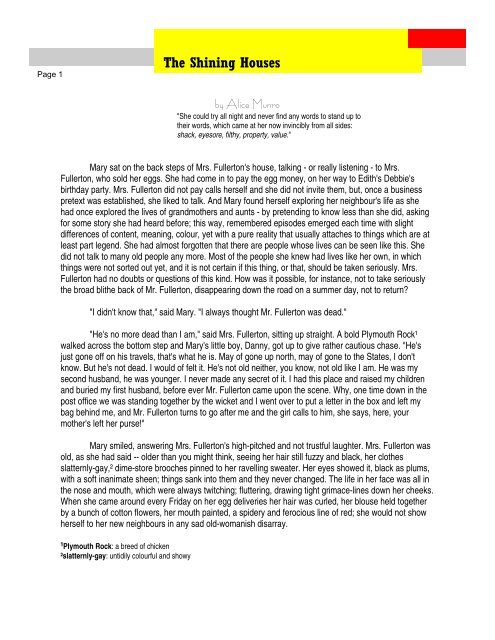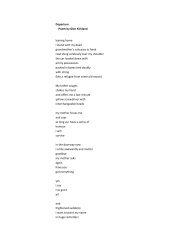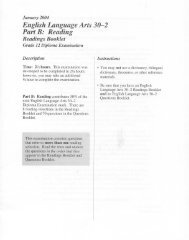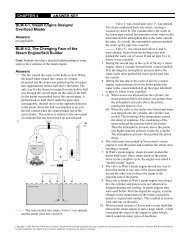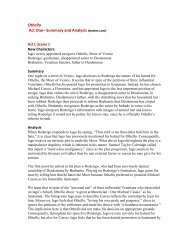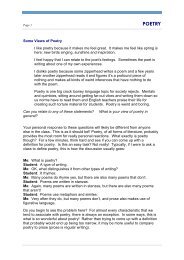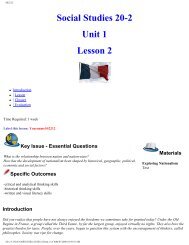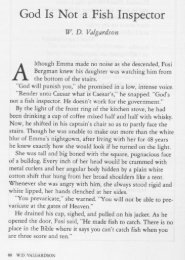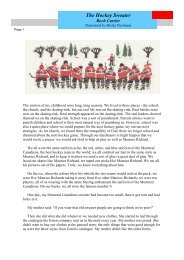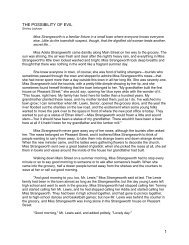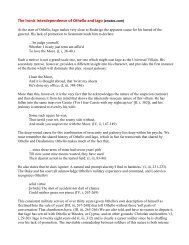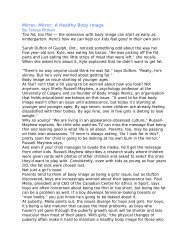Create successful ePaper yourself
Turn your PDF publications into a flip-book with our unique Google optimized e-Paper software.
Page 1<br />
<strong>The</strong> <strong>Shining</strong> <strong>Houses</strong><br />
by Alice Munro<br />
"She could try all night and never find any words to stand up to<br />
their words, which came at her now invincibly from all sides:<br />
shack, eyesore, filthy, property, value."<br />
Mary sat on the back steps of Mrs. Fullerton's house, talking - or really listening - to Mrs.<br />
Fullerton, who sold her eggs. She had come in to pay the egg money, on her way to Edith's Debbie's<br />
birthday party. Mrs. Fullerton did not pay calls herself and she did not invite them, but, once a business<br />
pretext was established, she liked to talk. And Mary found herself exploring her neighbour's life as she<br />
had once explored the lives of grandmothers and aunts - by pretending to know less than she did, asking<br />
for some story she had heard before; this way, remembered episodes emerged each time with slight<br />
differences of content, meaning, colour, yet with a pure reality that usually attaches to things which are at<br />
least part legend. She had almost forgotten that there are people whose lives can be seen like this. She<br />
did not talk to many old people any more. Most of the people she knew had lives like her own, in which<br />
things were not sorted out yet, and it is not certain if this thing, or that, should be taken seriously. Mrs.<br />
Fullerton had no doubts or questions of this kind. How was it possible, for instance, not to take seriously<br />
the broad blithe back of Mr. Fullerton, disappearing down the road on a summer day, not to return?<br />
"I didn't know that," said Mary. "I always thought Mr. Fullerton was dead."<br />
"He's no more dead than I am," said Mrs. Fullerton, sitting up straight. A bold Plymouth Rock¹<br />
walked across the bottom step and Mary's little boy, Danny, got up to give rather cautious chase. "He's<br />
just gone off on his travels, that's what he is. May of gone up north, may of gone to the States, I don't<br />
know. But he's not dead. I would of felt it. He's not old neither, you know, not old like I am. He was my<br />
second husband, he was younger. I never made any secret of it. I had this place and raised my children<br />
and buried my first husband, before ever Mr. Fullerton came upon the scene. Why, one time down in the<br />
post office we was standing together by the wicket and I went over to put a letter in the box and left my<br />
bag behind me, and Mr. Fullerton turns to go after me and the girl calls to him, she says, here, your<br />
mother's left her purse!"<br />
Mary smiled, answering Mrs. Fullerton's high-pitched and not trustful laughter. Mrs. Fullerton was<br />
old, as she had said -- older than you might think, seeing her hair still fuzzy and black, her clothes<br />
slatternly-gay,² dime-store brooches pinned to her ravelling sweater. Her eyes showed it, black as plums,<br />
with a soft inanimate sheen; things sank into them and they never changed. <strong>The</strong> life in her face was all in<br />
the nose and mouth, which were always twitching; fluttering, drawing tight grimace-lines down her cheeks.<br />
When she came around every Friday on her egg deliveries her hair was curled, her blouse held together<br />
by a bunch of cotton flowers, her mouth painted, a spidery and ferocious line of red; she would not show<br />
herself to her new neighbours in any sad old-womanish disarray.<br />
¹Plymouth Rock: a breed of chicken<br />
²slatternly-gay: untidily colourful and showy
Page 2<br />
<strong>Shining</strong> <strong>Houses</strong><br />
"Thought I was his mother," she said. "I didn't care. I had a good laugh. But what I was telling<br />
you," she said, "a day in summer, he was off work. He had the ladder up and he was picking me the<br />
cherries off of my black-cherry tree. I came out to hang my clothes and there was this man I never seen<br />
before in my life, taking the pail of cherries my husband hands down to him. Helping himself, too, not<br />
backward, he sat down and ate cherries out of my pail. Who's that, I said to my husband, and he says,<br />
just a fellow passing. If he's a friend of yours, I said, he's welcome to stay for supper. What are you talking<br />
about, he says, I never seen him before. So I never said another thing. Mr. Fullerton went and talked to<br />
him, eating my cherries I intended for a pie, but that man would talk to anybody, tramp, Jehovah's<br />
Witness, anybody - that didn't need to mean anything."<br />
"And half an hour after that fellow went off," she said, "Mr. Fullerton comes out in his brown jacket<br />
and his hat on. I have to meet a man downtown. How long will you be, I said. Oh, not long. So off he goes<br />
down the road, walking down to where the old tram went - we was all in the bush then - and something<br />
made me look after him. He must be hot in that coat, I said. And that's when I knew he wasn't coming<br />
back. Yet I couldn't've expected it, he liked it here. He was talking about putting chinchillas³ in the back<br />
yard. What's in a man's mind even when you're living with him you will never know."<br />
"Was it long ago?" said Mary.<br />
"Twelve years. My boys wanted me to sell then and go and live in rooms. But I said no. I had my<br />
hens and a nanny goat too at that time. More or less a pet. I had a pet coon too for a while, used to feed<br />
him chewing gum. Well, I said, husbands maybe come and go, but a place you've lived fifty years is<br />
something else. Making a joke of it with my family. Besides, I thought, if Mr. Fullerton was to come back,<br />
he'd come back here, not knowing where else to go. Of course he'd hardly know where to find me, the<br />
way it's changed now. But I always had the idea he might of suffered a loss of memory and it might come<br />
back. That has happened.<br />
"I'm not complaining. Sometimes it seems to me about as reasonable a man should go as stay. I<br />
don't mind changes, either, that helps out my egg business. But this baby-sitting. All the time one or the<br />
other is asking me about baby-sitting. I tell them I got my own house to sit in and I raised my share of<br />
children."<br />
Mary, remembering the birthday party, got up and called to her little boy. "I thought I might offer<br />
my black cherries for sale next summer," Mrs. Fullerton said. "Come and pick your own and they're fifty<br />
cents a box. I can't risk my old bones up a ladder no more."<br />
"That's too much," Mary said, smiling. "<strong>The</strong>y're cheaper than that at the supermarket." Mrs.<br />
Fullerton already hated the supermarket for lowering the price of eggs. Mary shook out her last cigarette<br />
and left it with her, saying she had another package in her purse. Mrs. Fullerton was fond of a cigarette<br />
but would not accept one unless you took her by surprise. Baby-sitting would pay for them, Mary thought.<br />
At the same time she was rather pleased with Mrs. Fullerton for being so unaccommodating. When Mary<br />
came out of this place, she always felt as if she were passing through barricades. <strong>The</strong> house and its<br />
³chinchillas: a squirrel-like rodent raised for its fur
Page 3<br />
<strong>Shining</strong> <strong>Houses</strong><br />
surroundings were so self-sufficient, with their complicated and seemingly unalterable layout of<br />
vegetables and flower beds, apple and cherry trees, wired chicken-run, berry patch and wooden walks,<br />
woodpile, a great many roughly built dark little sheds, for hens or rabbits or a goat. Here was no open or<br />
straightforward plan, no order that an outsider could under- stand; yet what was haphazard time had<br />
made final. <strong>The</strong> place had become fixed, impregnable, all its accumulations necessary, until it seemed<br />
that even the washtubs, mops, couch springs and stacks of old police magazines on the back porch were<br />
there to stay.<br />
Mary and Danny walked down the road that had been called, in Mrs. Fullerton's time, Wicks<br />
Road, but was now marked on the maps of the subdivision as Heather Drive. <strong>The</strong> name of the subdivision<br />
was Garden Place, and its streets were named for flowers. On either side of the road the earth was raw;<br />
the ditches were running full. Planks were laid across the open ditches, planks approached the doors of<br />
the newest houses. <strong>The</strong> new, white and shining houses, set side by side in long rows in the wound of the<br />
earth. She always thought of them as white houses, though of course they were not entirely white. <strong>The</strong>y<br />
were stucco and siding, and only the stucco was white; the siding was painted in shades of blue, pink,<br />
green and yellow, all fresh and vivid colours. Last year, just at this time, in March, the bulldozers had<br />
come in to clear away the brush and second-growth and great trees of the mountain forest; in a little while<br />
the houses were going up among the boulders, the huge torn stumps, the unimaginable upheavals of that<br />
earth. <strong>The</strong> houses were frail at first, skeletons of new wood standing up in the dusk of the cold spring<br />
days. But the roofs went on, black and green, blue and red, and the stucco, the siding; the windows were<br />
put in, and plastered with signs that said, Murry's Glass, French's Hardwood Floors; it could be seen that<br />
the houses were real. People who would live in them came out and tramped around in the mud on<br />
Sundays. <strong>The</strong>y were for people like Mary and her husband and their child, with not much money but<br />
expectations of more; Garden Place was already put down, in the minds of people who understood<br />
addresses, as less luxurious than Pine Hills but more desirable than Wellington Park. <strong>The</strong> bathrooms<br />
were beautiful, with three-part mirrors, ceramic tile, and coloured plumbing. <strong>The</strong> cupboards in the kitchen<br />
were light birch or mahogany, and there were copper lighting fixtures there and in the dining ells. Brick<br />
planters, matching the fireplaces, separated the living rooms and halls. <strong>The</strong> rooms were all large and light<br />
and the basements dry, and all this soundness and excellence seemed to be clearly, proudly indicated on<br />
the face of each house - those ingenuously similar houses that looked calmly out at each other, all the<br />
way down the street.<br />
Today, since it was Saturday, all the men were out working around their houses. <strong>The</strong>y were<br />
digging drainage ditches and making rockeries and clearing off and burning torn branches and brush.<br />
<strong>The</strong>y worked with competitive violence and energy, all this being new to them; they were not men who<br />
made their livings by physical work. All day Saturday and Sunday they worked like this, so that in a year<br />
or two there should be green terraces, rock walls, shapely flower beds and ornamental shrubs. <strong>The</strong> earth<br />
must be heavy to dig now; it had been raining last night and this morning. But the day was brightening;<br />
the clouds had broken, revealing a long thin triangle of sky, its blue still cold and delicate, a winter colour.<br />
Behind the houses on one side of the road were pine trees, their ponderous symmetry not much stirred by<br />
any wind. <strong>The</strong>se were to be cut down any day now, to make room for a shopping centre, which had been<br />
promised when the houses were sold.
Page 4<br />
<strong>Shining</strong> <strong>Houses</strong><br />
And under the structure of this new subdivision, there was still something else to be seen; that<br />
was the old city, the old wilderness city that had lain on the side of the mountain. It had to be called a city<br />
because there were tramlines running into the woods, the houses had numbers and there were all the<br />
public buildings of a city, down by the water. But houses like Mrs. Fullerton's had been separated from<br />
each other by uncut forest and a jungle of wild blackberry and salmonberry bushes; these surviving<br />
houses, with thick smoke coming out of their chimneys, walls unpainted and patched and showing<br />
different, degrees of age and darkening, rough sheds and stacked wood and compost heaps and grey<br />
board fences around them - these appeared every so often among the large new houses of Mimosa and<br />
Marigold and Heather Drive - dark, enclosed, expressing something like savagery in their disorder and the<br />
steep, unmatched angles of roofs and lean-tos; not possible on these streets, but there.<br />
"What are they saying?" said Edith, putting on more coffee. She was surrounded in her kitchen by<br />
the ruins of the birthday party -- cake and molded jellies and cookies with animal faces. A balloon rolled<br />
underfoot. <strong>The</strong> children had been fed, had posed for flash cameras and endured the birthday games; now<br />
they were playing in the back bedrooms and the basement, while their parents had coffee. "What are they<br />
saying in there?” said Edith.<br />
"I wasn't listening," Mary said, holding the empty cream pitcher in her hand. She went to the sink<br />
window. <strong>The</strong> rent in the clouds had been torn wide open and the sun was shining. <strong>The</strong> house seemed too<br />
hot.<br />
"Mrs. Fullerton's house," said Edith, hurrying back to the living-room. Mary knew what they were<br />
talking about. Her neighbours' conversation, otherwise not troubling, might at any moment snag itself on<br />
this subject and eddy menacingly in familiar circles of complaint, causing her to look despairingly out of<br />
windows, or down into her lap, trying to find some wonderful explanatory word to bring it to a stop; she did<br />
not succeed. She had to go back; they were waiting for cream.<br />
A dozen neighbourhood women sat around the living room, absently holding the balloons they<br />
had been given by their children. Because the children on the street were so young, and also because<br />
any gathering-together of the people who lived there was considered a healthy thing in itself, most<br />
birthday parties were attended by mothers as well as children. Women who saw each other every day met<br />
now in earrings, nylons and skirts, with their hair fixed and faces applied. Some of the men were there too<br />
- Steve, who was Edith's husband, and others he had invited in for beer; they were all in their work<br />
clothes; <strong>The</strong> subject just introduced was one of the few on which male and female interest came together.<br />
"I tell you what I'd do if I was next door to it," Steve said, beaming good-naturedly in expectation<br />
of laughter. "I'd send my kids over there to play with matches."<br />
"Oh, funny," Edith said. "It's past joking. You joke, I try to do something. I even phoned the<br />
Municipal Hall."<br />
"What did they say?" said Mary Lou Ross.<br />
"Well, I said couldn't they get her to paint it, at least, or pull down some of the shacks, and they
Page 5<br />
<strong>Shining</strong> <strong>Houses</strong><br />
said no they couldn't. I said I thought there must be some kind of ordinance applied to people like that and<br />
they said they knew how I felt and they were very sorry-"<br />
"But no?"<br />
"But no."<br />
"But what about the chickens, I thought-"<br />
"Oh, they wouldn't let you or me keep chickens, but she has some special dispensation about that<br />
too, I forgot how it goes."<br />
"I'm going to stop buying them," Janie Inger said. "<strong>The</strong> supermarket's cheaper and who cares that<br />
much about fresh? And my God, the smell. I said to Carl I knew we were coming to the sticks but I<br />
somehow didn't picture us next door to a barnyard."<br />
"Across the street is worse than next door. It makes me wonder why we ever bothered with a<br />
picture window, whenever anybody comes to see us I want to draw the drapes so they won't see what's<br />
across from us."<br />
"Okay, okay," Steve said, cutting heavily through these female voices. "What Carl and I started<br />
out to tell you was that, if we can work this lane deal, she has got to go. It's simple and it's legal. That's<br />
the beauty of it."<br />
"What lane deal?"<br />
"We are getting to that. Carl and I been cooking this for a couple of weeks, but we didn't like to<br />
say anything in case it didn't work out. Take it, Carl."<br />
"Well, she's on the lane allowance, that's all," Carl said. He was a real estate salesman, stocky,<br />
earnest, successful. "I had an idea it might be that way, so I went down to the Municipal Hall and looked it<br />
up."<br />
"What does that mean, dear?" said Janie, casual, wifely.<br />
"This is it," Carl said. "<strong>The</strong>re's an allowance for a lane, there always has been, the idea being if<br />
the area ever got built up they would put a lane through. But they never thought that would happen,<br />
people just built where they liked. She's got part of her house and half a dozen shacks sitting right where<br />
the lane has to go through. So what we do now, we get the municipality to put through a lane. We need a<br />
lane anyway. <strong>The</strong>n she has to get out. It's the law."<br />
"It's the law," said Steve, radiating admiration. "What a smart boy. <strong>The</strong>se real estate operators are<br />
smart boys."<br />
"Does she get anything?" said Mary Lou. "I'm sick of looking at it and all but I don't want to see
Page 6<br />
anybody in the poorhouse."<br />
<strong>Shining</strong> <strong>Houses</strong><br />
"Oh, she'll get paid. More than it's worth. Look, it's to her advantage. She'll get paid for it, and she<br />
couldn't sell it, she couldn't give it away."<br />
Mary set her coffee cup down before she spoke and hoped her voice would sound all right, not<br />
emotional or scared. "But remember she's been here a long time," she said. "She was here before most of<br />
us were born." She was trying desperately to think of other words, words more sound and reasonable<br />
than these; she could not expose to this positive tide any notion that they might think flimsy and romantic,<br />
or she would destroy her argument. But she had no argument. She could try all night and never find any<br />
words to stand up to their words, which came at her now invincibly from all sides: shack, eyesore, filthy,<br />
property, value.<br />
"Do you honestly think that people who let their property get so rundown have that much claim to<br />
our consideration?" Janie said, feeling her husband's plan was being attacked.<br />
"She's been here forty years, now we're here," Carl said. "So it goes. And whether you realize it<br />
or not, just standing there that house is bringing down the resale value of every house on this street. I'm in<br />
the business, I know."<br />
And these were joined by other voices; it did not matter much what they said as long as they were<br />
full of self-assertion and anger. That was their strength, proof of their adulthood, of themselves and their<br />
seriousness. <strong>The</strong> spirit of anger rose among them, bearing up their young voices, sweeping them together<br />
as on a flood of intoxication, and they admired each other in this new behaviour as property-owners as<br />
people admire each other for being drunk.<br />
"We might as well get everybody now," Steve said. "Save going around to so many places."<br />
It was supper time, getting dark out. Everybody was preparing to go home, mothers buttoning<br />
their children's coats, children clutching, without much delight, their balloons and whistles and paper<br />
baskets full of jelly beans. <strong>The</strong>y had stopped fighting, almost stopped noticing each other; the party had<br />
disintegrated. <strong>The</strong> adults too had grown calmer and felt tired.<br />
"Edith! Edith, have you got a pen?" Edith brought a pen and they spread the petition for the lane,<br />
which Carl had drawn up, on the dining-room table, clearing away the paper plates with smears of dried<br />
ice cream. People began to sign mechanically as they said goodbye. Steve was still scowling slightly; Carl<br />
stood with one hand on the paper, businesslike, but proud. Mary knelt on the floor and struggled with<br />
Danny's zipper. She got up and put on her own coat, smoothed her hair, put on her gloves and took them<br />
off again. When she could not think of anything else to do she walked past the dining-room table on her<br />
way to the door. Carl held out the pen.<br />
"I can't sign that," she said. Her face flushed up, at once, her voice was trembling. Steve touched<br />
her shoulder.
Page 7<br />
"What's the matter, honey?"<br />
"I don't think we have the right. We haven't the right."<br />
"Mary, don't you care how things look? You live here too."<br />
<strong>Shining</strong> <strong>Houses</strong><br />
"No, I - I don't care." Oh, wasn't it strange, how in your imagination, when you stood up for<br />
something, your voice rang, people started, abashed; but in real life they all smiled in rather a special way<br />
and you saw that what you had really done was serve yourself up as a conversational delight for the next<br />
coffee party.<br />
"Don't worry, Mary, she's got money in the bank," Janie said. "She must have. I asked her to<br />
baby-sit for me once and she practically spit in my face. She isn't exactly a charming old lady, you know."<br />
"I know she isn't a charming old lady," Mary said.<br />
Steve's hand still rested on her shoulder. "Hey what do you think we are, a bunch of ogres?"<br />
"Nobody wants to turn her out just for the fun of it," Carl said. "It's unfortunate. We all know that.<br />
But we have to think of the community."<br />
"Yes," said Mary. But she put her hands in the pockets of her coat and turned to say thank you to<br />
Edith, thank you for the birthday party. It occurred to her that they were right, for themselves, for whatever<br />
it was they had to be. And Mrs. Fullerton was old, she had dead eyes, nothing could touch her. Mary went<br />
out and walked with Danny up the street. She saw the curtains being drawn across the living-room<br />
windows; cascades of flowers, of leaves, of geometrical designs, shut off these rooms from the night.<br />
Outside it was quite dark, the white houses were growing dim, the clouds breaking and breaking, and<br />
smoke blowing from Mrs. Fullerton's chimney. <strong>The</strong> pattern of Garden Place, so assertive in the daytime,<br />
seemed to shrink at night into the raw black mountainside.<br />
<strong>The</strong> voices in the living room have blown away, Mary thought. If they would blow away and their<br />
plans be forgotten, if one thing could be left alone. But these are people who win, and they are good<br />
people; they want homes for their children, they help each other when there is trouble, they plan a<br />
community - saying that word as if they found a modern and well-proportioned magic in it, and no<br />
possibility anywhere of a mistake.<br />
heart.<br />
<strong>The</strong>re is nothing you can do at present but put your hands in your pockets and keep a disaffected<br />
Alice Munro's first collection of short stories, Dance of the Happy Shades (from which this story was<br />
taken), was published in 1968 and won a Governor General's Award. In 1977, Munro became the first<br />
Canadian to win the Canada-Australia Literary Prize. She went on to win two more Governor General's<br />
Awards for her collections, Who Do You Think You Are? and <strong>The</strong> Progress of Love.<br />
story taken from the anthology, Imprints 12
Reservoir<br />
by Michael Berger. Digital watercolour<br />
http://gcc.bradley.edu/exhibit/98/2/reservoir/<br />
• Berger’s image is strongly geometrical; identify the basic shapes he uses to<br />
construct this landscape.<br />
• Are there any details in the image that work against its linearity?<br />
• What effect does the work create?<br />
• What ideas might the artist be suggesting?<br />
Page 8
Page 1<br />
Other notes:<br />
Engl 206: Short Story<br />
Student notes on Munro, "<strong>The</strong> <strong>Shining</strong> <strong>Houses</strong>"<br />
narrative aspects interpretation theoretical aspects<br />
characterization: Mary's point of view<br />
encourages the reader to sympathize<br />
with her cause; she stands up for what<br />
she believes in;<br />
setting: "that house is bringing down the<br />
resale value of every house on the<br />
street": conflict between Mrs Fullerton<br />
and estate agent.<br />
emotions orient us towards both sides of<br />
case: Mary vs. other members of community.<br />
character: Mrs Fullerton developed in<br />
isolation from other characters; she is<br />
only discussed by them; thus associated<br />
with moral aspects of land development<br />
issue, not personalized through interaction.<br />
points of view: (1) inside Mrs Fullerton's<br />
house, exposed to her feelings; (2)<br />
across the street, community point of<br />
characterization: all are flat except for<br />
Mary<br />
point of view: story mediated through<br />
Mrs Fullerton's position coming first in<br />
story.<br />
• stereotyped characters and their stereotypical expectations of community are imposed over the idiosyncrasy<br />
of individualist Mrs Fullerton;<br />
• power struggle manifested in torn up hillside, violence of men's work on gardens, legal strategy to evict Mrs<br />
Fullerton; children's party an interesting mirror image reversal of this: constraint of flash cameras and<br />
birthday games, then they go wild;<br />
• reduction of values to money, what compensation Mrs Fullerton will get;<br />
• gender issue: individuals under attack, rendered powerless, happen to be the women: Mrs Fullerton and<br />
Mary; real power lies with the men, Carl and Steve, and their "lane deal."<br />
http://www.ualberta.ca/~dmiall/Winter2001/Munro.htm<br />
story centers around the issue of change in or<br />
threat to an existing community<br />
settles on the moral issue of one's right to<br />
force people out of their old community in<br />
order to bring in a new one.<br />
an exploration of human nature: exclusion of<br />
the individual as a result of group mentality<br />
and petty behaviour: cf. "And these were<br />
joined . . . each other for being drunk" (238).<br />
contrast of Mrs Fullerton's immobility vs. Mr<br />
Fullerton breaking away.<br />
two cultures, separate worlds: each refuses<br />
to take part in order to understand the other;<br />
shows conflict, power struggle<br />
inner world of self: Mary shows how she<br />
deals with the situation, "<strong>The</strong>re is nothing you<br />
can do . . . keep a disaffected heart" (239);<br />
-- prompts readers to examine what their<br />
stance would be, their own inner morals.<br />
"light of the flash": focus on the moment, no<br />
before or after; collective feeds off each other<br />
in the heat of the moment;<br />
remoteness from community: community vs.<br />
isolation of Mrs Fullerton (238)<br />
Mr Fullerton's youngness contrasts with Mrs<br />
Fullerton's age: represents change (new<br />
houses) vs. unchanging.<br />
character: stereotyped characters of community<br />
as young, idealistic, self-absorbed; no<br />
respect for traditional values and the elderly,<br />
except for Mary
Page 2<br />
A <strong>Shining</strong> Reason To Hope<br />
<strong>The</strong>re is a reason to hope in all literature. Hope can be defined as something which one longs to see realized, or in<br />
other words, any form of optimism, with a belief of a positive outcome. Hope in a piece of literature verifies a level<br />
of goodness in the world, which can be illustrated many different ways by an author.<br />
"<strong>The</strong> <strong>Shining</strong> <strong>Houses</strong>" by Alice Munro is an auspicious example of hope in a short story.<br />
Alice Munro effectively uses different techniques to present hope in "<strong>The</strong> <strong>Shining</strong> <strong>Houses</strong>." Through her use of<br />
characterization, theme and symbolism, Munro competently illustrates hope, creating optimism with the use of<br />
these three short story components.<br />
<strong>The</strong> first technique that aids in the creation of hope in "<strong>The</strong> <strong>Shining</strong> <strong>Houses</strong>" is symbolism in the title. <strong>The</strong> word<br />
"shining" alone has many optimistic elucidations, including magnificent, elegant, radiant, glowing, clean and<br />
polished. <strong>The</strong>se words are all heartening, and create an optimistic mood from the beginning of the story. <strong>The</strong><br />
optimistic mood created by the title carries throughout the story, encouraging the reader to identify other conditions<br />
of hope further on.<br />
In addition to symbolism in the title, Alice Munro creates hope through characterization. <strong>The</strong> character who<br />
contains the prevailing amount of hope in "<strong>The</strong> <strong>Shining</strong> <strong>Houses</strong>" is Mary. Mary is the only character in the story that<br />
has a personal relationship with Mrs. Fullerton. Mary Would "sit on the back steps of Mrs. Fullerton's house, talking<br />
- or really listening - to Mrs. Fullerton". This detail creates a tone of hope for the reader. Because the reader soon<br />
finds out that the other members of the community consider Mrs. Fullerton an outcast, Mary is considered as an<br />
inspiration, because she ignores the community's thoughts of Mrs. Fullerton, and continues to have a relationship<br />
with her.<br />
Mary is also a sign of hope to Mrs. Fullerton, reassuring Mrs. Fullerton that not everyone in the community is<br />
against her. Latter on in the story, when the petition to get Mrs. Fullerton out of the community is presented at a<br />
child's birthday party, Mary's hope is once again present. Mary is the only person to voice concern for Mrs.<br />
Fullerton when the petition is presented. While the other members of the community were all discussing the<br />
pessimistic aspects of Mrs. Fullerton's presence, Mary replied with the statements, "But remember she's been here<br />
a long time," and "she was here before most of us were born". Latter on, when Mary is asked to sign the petition<br />
she replies that she can't, accompanied with the statement, "I don't think we have the right. We haven't the right".<br />
<strong>The</strong>se statements all show how truly strong Mary is.<br />
Mary is not only strong because she defended Mrs. Fullerton, but she also has great personal strength, because<br />
she defended her personal opinions. Mary's strength also creates a positive mood, which reassures the reader that<br />
there are truly good people in the world. Mary herself is also a symbol of hope, allowing the reader to realize that<br />
as long as there is one genuine person in the world, there is reason to hope.<br />
<strong>The</strong> third technique that Alice Munro uses to create hope in "<strong>The</strong> <strong>Shining</strong> <strong>Houses</strong>" is theme. <strong>The</strong> theme of "<strong>The</strong><br />
<strong>Shining</strong> <strong>Houses</strong>" is that, even though there are many people in the world who are willing to harm others for their<br />
own benefit, there will always be someone who will withstand the opposition, and truly believe in the wellbeing of<br />
everyone. This theme is the basic foundation for hope. It gives everyone a reason to believe that whatever the<br />
situation, someone will always be there to help you.<br />
Knowing that there will always be someone there for you makes one truly realize that there is goodness in the<br />
world. Hope gives anyone a reason to believe, and in a piece of literature, this reason to believe creates a warm,<br />
positive mood. Hope is one of the highest levels of optimism, and along with being present in every piece of<br />
literature, hope is also present in everyone's life. Hope allows one to truly believe in the goodness of humankind,<br />
which results in true optimism, and a better quality of life for the true believers.<br />
http://www.123student.com/english/1353.shtml


